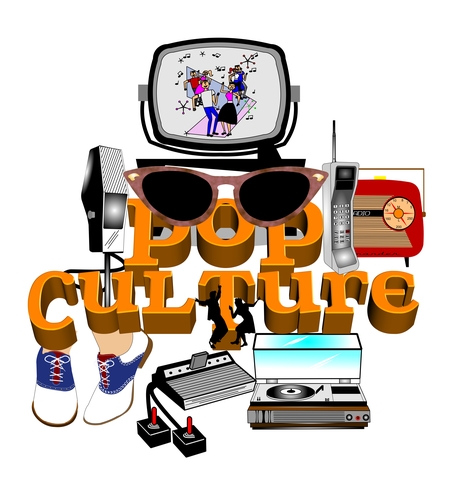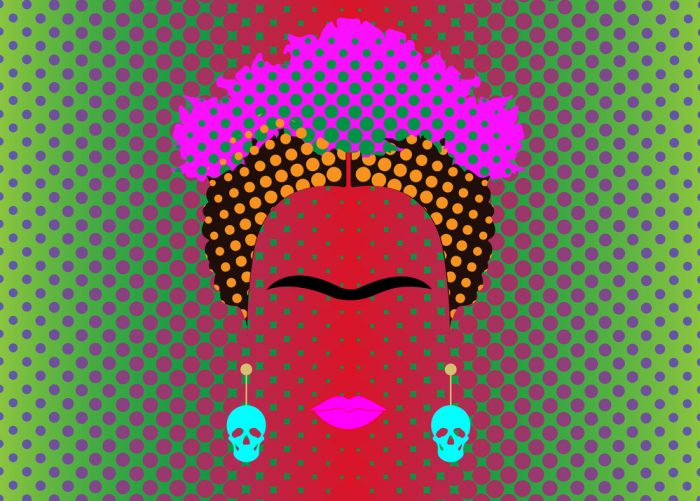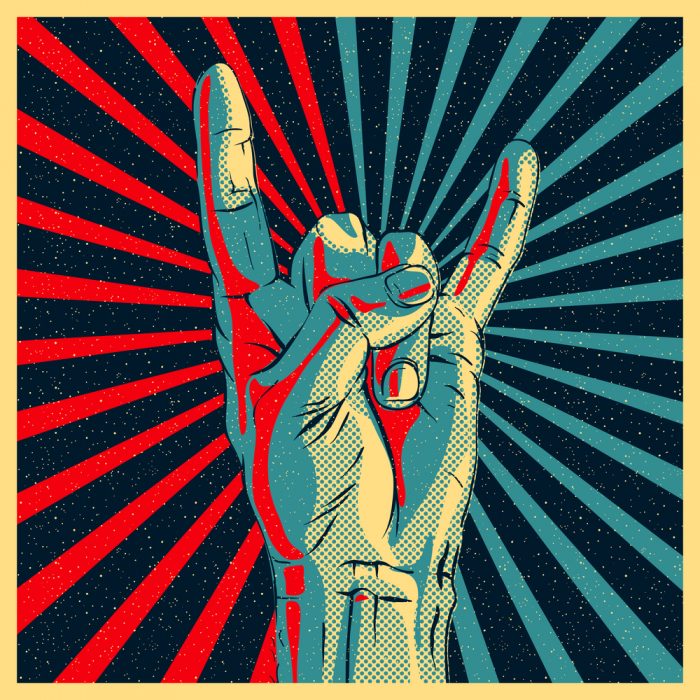When most people think of pop culture essay topics, their minds quickly gravitate to current television shows and music—and this is understandable. Pop culture centers on the aspects of entertainment, art, leisure, fashion, gaming and music that are popular right now or in recent history. But pop culture consumes so much more than that—pop culture also refers to the lifestyle of how people communicate, spend their leisure time, and relax. This even includes what kind of food they eat. For example, in the 1950s poodle skirts and bold A-line skirts were all the fashion, everyone was listening to Elvis Presley, driving big Chevrolets, watching Leave it to Beaver and I Love Lucy, and hanging out in diners, soda shops and drug stores.

The 1980s represented a more radical swing in the opposite direction. Fashions involved strange, color combinations that were bold and sometimes garish, neon colors were popular, as were leggings, big socks, oversized shirts, punk fashions, and track suits. Michael Jackson and Madonna asserted themselves as the king and queen of pop music. Shows like Different Strokes, Eight is Enough and The Facts of Life enjoyed high ratings. Movies were excellent as this was the decade that gave us such classics as ET and Back to the Future. Low fat diets were all the rage and young people were often found hanging out in shopping malls in their free time.
As for this decade, the 2010s, social media is king. Smart phones, particularly Apple iPhones, dominate how young people communicate and assert social status. Musicians like Taylor Swift, Drake, Maroon 5 and Lady Gaga dominate the music industry. Shows like Breaking Bad and Stranger Things have enjoyed widespread popularity. In this decade, athleisure has made a resurgence as has hipster-influenced ensembles: this has translated to more unisex items and grunge pieces. Coffee culture continues to dominate, with young people often hanging out at coffee places and cafes. Reality shows continue to receive bigger audiences, and the Kardashian family is still somehow famous.
What these examples attempt to illustrate is that pop culture is more than just the media and entertainment industries. It’s how people interact with one another and how they spend their time—particularly youth culture. If you’re ever assigned an essay on pop culture, definitely resist the urge to talk about common aspects of pop culture such as “why is reality television so dumb but people watch it anyway?” Sure, that’s a fair question, but it’s a more obvious essay topic on pop culture. Writing an essay on pop culture is more fun and accessible than say, an essay on Bavarian Monk Poetry of the 7th century. Thus, take some time to dig deep so that you can come up with something really original. Giving yourself a moment to find a more unique topic will impress your teacher before he/she even starts reading.
Pop Culture Essay Topics
Beauty & Appearance
- Lip injections, butt injections, cheek injections, Botox. One could argue that the 2010s were the decade when injections (mainly for women) became mainstream and even encouraged. Is this toxic femininity that just seeks to imitate celebrities and hang on to shreds of eternal youth? Or do you see it as self-empowerment to shape one’s appearance based on how one decides?
- The 1990s saw the worship of heroin chic and uber-thin models like Kate Moss. Current pop culture trends now focus on curvy women, with an emphasis on robust butts, hips and small waists. Should one interpret this as a healthier perspective on the female form, or is this just a modern day manifestation of a 19th century corset? Explain why or why not.
- The expectations for women in regards to fashion and beauty is exponentially more intense than for men. The requirements of grooming for men really just includes a hair cut and a shave and they are good to go. Is the fashion and beauty industry part of a conspiracy to keep women poor and to ensure that all their money goes to upkeep, looking young and staying current with trends? Or is it an optional form of creative self-expression that allows women a freedom men are not provided with by our society?
- Eyebrows have recently enjoyed a resurgence of attention. Big bushy eyebrows are the latest trend and many women feel pressured to spend more money and time on shaping, extending and feathering their brows. What do you make of this trend? Is it just a harmless blip in fashion, such as the big hair of the 1980s and another way women can express creativity and shape their own aesthetic? Alternatively, do you see it as yet another way women are manipulated to spend money and feel insecure?

Entertainment
- Celebrity worship is not new, but is something that has been a part of human experience for centuries, ever since people have exhibited skills others do not possess while maintaining a degree of inaccessibility. Opera singers and silent film stars were the celebrities of 100 years ago. The Greeks and Romans had warriors that were celebrities of their era, and royal families throughout history were the figures of intrigue to everybody else. However, the way that celebrity culture manifests in this decade is different from times past. Is it healthier in that countless blogs and tweets mock celebrities for their privilege, their embarrassments, and call them out on bad behavior publicly? Or is celebrity culture more dysfunctional today in that social media allows us a constant degree of surveillance into the lives and images of celebrities?
- Movies and television shows about dystopian futures and post-apocalyptic societies have barraged us for over a decade now. Is this harmless creativity or something else? Is this a productive way to vent anxiety about the future in a safe and creative fashion? Is there danger of us manifesting such dreary events by consuming this type of entertainment? Do such shows and films groom us into accepting or expecting a bleak future?
- For every show or film with a strong heroine who saves the day, there are at least five others who show women as either a sexualized object or as a supportive non-entity (such as the girlfriend who helps the hero achieve his goal). Why do female characters remain so one-dimensional and under-developed, despite all the strides that gender equality has made elsewhere?
- Andy Warhol made himself famous by both celebrating the beauty of the ordinary object in the every day, as well as with his unique perspective on celebrity. Warhol was adept at shining a light on the grotesqueness of celebrity culture, as well as the tendency of society to create, consume and discard celebrities. Who is the Andy Warhol of this generation?
- In almost every field of entertainment—acting, singing, writing, dancing—there are equal numbers of women and men—except for directing. Some have argued that it’s harder for women to secure financing for their films or to be hired to direct already financed films. Others disagree, arguing that there are simply fewer female directors because women generally have a minimized interest in directing. Which perspective do you agree with? Why is directing cinema and television so hard for women to break into?
- Vampiric entities have been recorded in folklore all over the world for centuries. Many different cultures have their own words for what a vampire, and these words long predate Bram Stoker’s Dracula of the 19th century. However, of late there has been a reemergence in fascination with the vampire in popular culture in the last ten plus years. What reason is there for this renewed interest and what do you make of it?
- One benefit that reality television has provided is an influx of shows on ghosts, the afterlife and the paranormal. Many have argued that this has helped to expand consciousness about the nature of our reality. Others argue these shows are all fake and are just harmless entertainment. What do you make of this sector of reality television? Does it enhance our understanding of the world or the opposite?
- A few decades ago, pop culture had a more tactile aspect to it. If you wanted a book or album you had to go to the store and buy it. If you wanted to see a movie you had to walk to the cinema and purchase a paper ticket. The digital era has transformed and changed these aspects to a certain extent, making much consumption more instantaneous and less tactile. Do these two qualities affect our experience of art and entertainment? Does a book have a different impact if we hold it in our hands as we read? Does a song influence us differently if we have an album cover and liner notes to thumb through? Take a position and discuss.
- Male heroes in the movies are often portrayed doing violent, dangerous stuff, from jumping out of planes, to scaling big buildings as they explode, to shooting semi-automatic weapons from speeding boats. Are movies like this just harmless fantasy and entertainment, or do they have a hand in promoting toxic masculinity?
- American culture is exported all over the world, with American celebrities being recognized far and wide. Why is this the case with our popular culture? Why is it so widely accepted and embraced? Many dismiss this with the mere fact that our nation is a super power. However, powerful countries like Russia, China and even Great Britain don’t seem to enjoy the same level of interest in their own popular culture around the world. Explain this dynamic? Is it good for the world that there’s such a profound interest in American culture?
- Batman is a fictional character who has been played by numerous actors on the big and small screen (Michael Keaton, Val Kilmer, George Clooney, Ben Affleck, Christian Bale, etc.). Pick one of the actors that you think was the most accurate portrayal of Bruce Wayne/Batman and make a nuanced, well supported argument as to why this actor represented this character in the most accurate and memorable way.
- Netflix and Chill? The way a society relaxes and spends its leisure time is often a barometer for how healthy and stable it is. More and more time is being spent inside the home to enjoy forms of entertainment. Discuss the economic, manufacturing and social reasons for this change and determine whether you think it is good or bad.
- 4-D refers to a method of presenting a film that combines 3-D viewing with physical sensations that occur in conjunction with how/when they occur for the fictional characters in the film. This mean the viewer might experience tilts, water sprays, wind, temperature fluctuations, and gentle pounding. Do you think 4-D is a passing fad or does it really represent the future of cinema? Explain.
- Why do action movies almost always outperform films of other genres? Discuss.
- Do romantic comedies give people are warped expectation of what relationships are like? Or do they help rekindle the belief in true love of a cynical society?
- Comedic films starring women almost always under-perform films of the same genre starring men. The problem is almost always in the script. Why do critically lauded and world-renowned comedic writers find it so difficult to write tight funny scripts for women?

Social Issues & Trends
- Homosexuality in general has long been a punchline or a fear in popular culture. Shows like Seinfeld, Friends, and many others used thinly veiled homophobia as a punchline for numerous set-ups and jokes. However, the tide has begun to change. Select one or two shows or films that have an accurate, nuanced representation of an LGBTQ character and discuss how previous failings in pop culture have gotten us to where we are now.
- Hip hop music created its own cultural firestorm, giving a voice, exposure and a platform to artists who had very specific backgrounds and experiences in society—often unpleasant or violent ones. Hip hop has spread all over the globe, creating a culture that extends directly from it. In your opinion, has this improved or strained race relations? Discuss.
- Gender fluidity is a hot button word in our culture. Many people cite an emergence of unisex clothing, hairstyles and celebrities as having an influence on this trend. Do you think this will help or hurt gender relations and the LGBTQ movement, why or why not?
- Roman Polanski made what some have lauded as the greatest and most accurate representation of the Holocaust the world has ever known, in his film, The Pianist. He also pleaded guilty to repeated sexual assaults (and drugging ) of several teenager girls. He later fled to France. There are many stories just like this, particularly ones emerging in recent times. Bad people and great art: does the morality of the creator matter? How should society treat good art that has been created by immoral people? Discuss.
- Compare and contrast children’s television of decades past to what is being made for children’s consumption today. Which is better? Explain.
- More and more adolescents can be found doing their homework or hanging out with their friends at a local Starbucks or equivalent coffee place. Is this trend healthy or unhealthy? Explain.
- Are reality shows like Toddlers and Tiaras a form of child abuse and exploitation? Should they be banned? Explain.
Conclusion
Searching through pop culture essay topics should be fun. It should be an experience that wakes you up to cultural trends and phenomena that you weren’t completely aware of. When you do pick a topic, definitely select one that speaks to a natural interest of yours and that you have an inherent curiosity about. In order to write the most complex essay, you will need to do some research—not just on the subject of popular culture selected, but on the trends that predated it and called it into being. This will empower you to view it with more complexity and nuance. You also want to make sure you have a host of examples available at your fingertips that all illustrate your point. When you’re making a strong argument about a certain belief about a pattern in pop culture, definitely anticipate the opinion of a dissenter and address it. Acknowledging the perspective of those who disagree with you shows both the strength of your argument and your knowledge of subject. This is a strategy that helps to present you as more of an informed expert on the issue.






Comments